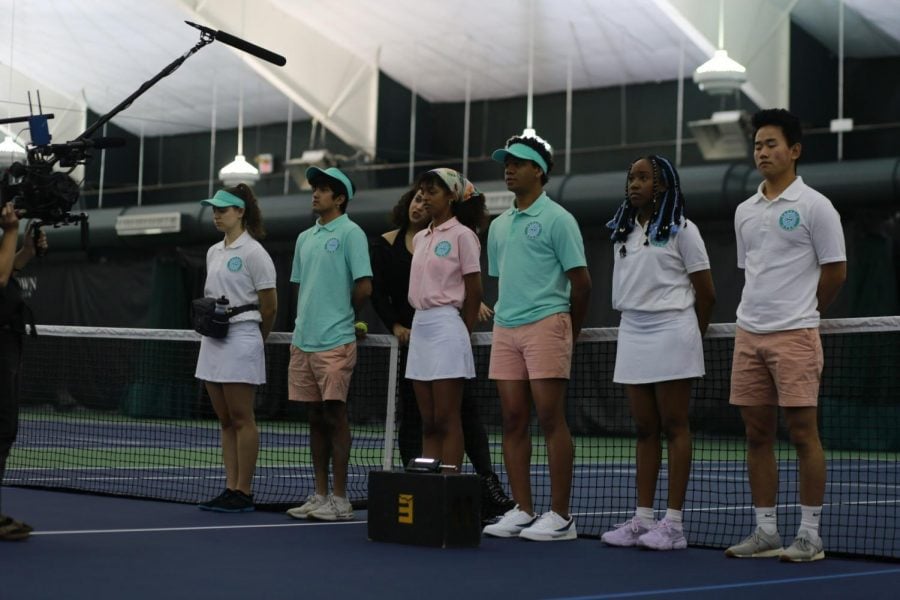Halsey’s Black Creators Funding Initiative recipient and NU alumnus Robert Cunningham creates web series How to L0ve
Courtesy of Amira K Photography
The cast and crew of How to L0ve during their first week of filming.
October 26, 2020
After watching Wimbledon and noticing how the ball runners were constantly hit by tennis balls, Northwestern alumnus Robert Cunningham (Communication ‘18) decided to start a comedic web series “How to L0ve” centering around the experiences of these behind-the-scenes tennis workers as they run onto the court and pick up the balls.
Cunningham grew up in the Atlanta suburbs as a queer kid who loved watching and playing sports. He loved playing tennis with his dad growing up, and the idea of making a series about the trials and tribulations of being a ball kid felt funny and right to him, he said. One of Cunningham’s goals after graduating from NU was to create his own project that would involve acting and writing.
“As a Black, queer actor sometimes you don’t see the opportunities there, so it lit a fire under my ass,” Cunningham said. “I wanted to make an opportunity for myself and for my community of peers and artists.”
“How to L0ve” centers around three teenagers who reunite every summer to work as ball kids, and at the end of the summer, one kid is chosen to work at the US Open. Cunningham said since tennis is a very white elitist sport, the subtext of the show is showcasing Black athletes in places that weren’t made for them.
Cunningham had one goal this year: to make and produce the series. But once the pandemic hit, the goal got a little harder to achieve. Funds were low and finding an affordable place to film, especially tennis courts, was proving difficult.
Then, the singer Halsey chose Cunningham as a first-round recipient of her Black Creators Funding Initiative, an initiative to support Black artists, and his luck changed. With her help, Cunningham was able to expand the budget for the series and bring it to life, he said.
“To get to speak with her, I felt almost guilty for how good of a mood I was in on a personal level,” Cunningham said. “She told me she chose my project for a reason — she is biracial and she said the story really resonated with her and taking up space as a Black person is important.”
With Halsey’s support and her connections, Cunningham and his crew got an opportunity to shoot at one of Chicago’s tennis clubs. As the weather grew colder, however, the club could not afford to let the team shoot during the day. As a result, “How to L0ve” will be filmed entirely at night.
Devyn Johnson (Communication ‘18), director of the series, said the dedication of the team made the show an easy decision to ultimately make.
“It’s just part of the job, you’re either going all hours of the night or all hours of the day,” Johnson said. “I’ve done stuff where we’re just putting in 12-hour days and that’s just normal.”
Another concern the crew experienced was ensuring the safety of everyone on set and not worsening the spread of COVID-19. To combat this, they hired a COVID-19 supervisor that tests often between filming and checks that necessary documentation has been fulfilled.
“We all miss doing what we love and are willing to have a swab stuck up or nose once or twice during the set to make it all happen,” Johnson said.
Communication senior Rishi Mahesh joined the project as one of the youngest members of the cast. He said it was exciting to do stuff in a new environment with new people since, during the pandemic, acting has been on hold and social interactions have been limited.
While being one of the younger cast members was exciting, Mahesh said he felt more pressure to show up every day and not let the rest of the crew down. Despite his excitement, Mahesh still had his COVID-19 concerns.
“I’m a little tiny Northwestern senior with very little professional experience here,” Mahesh said. “Am I going to forget something stupid? Am I going to show up and accidentally have COVID?”
One of Cunningham’s goals with the project was to make it as diverse as possible, with a majority Black and brown cast and crew. He said he felt the space he created was an important and necessary one.
“A huge thing people are realizing now is that we need to lift up Black art and Black voices, and even though it’s a comedy first and foremost, it has a deeper context that hopefully resonates with the right people,” Cunningham said. “We’re in such a dark, confusing time so I hope it can bring a little glimmer of joy and happiness.”
Email: [email protected]
Twitter: @rebecca_aizin
Related Stories:
— Northwestern alumni created Spectrum Ensemble to increase queer visibility
— Taking Back the Stage: Black artists celebrate their experiences in “BLACK JOY” showcase


